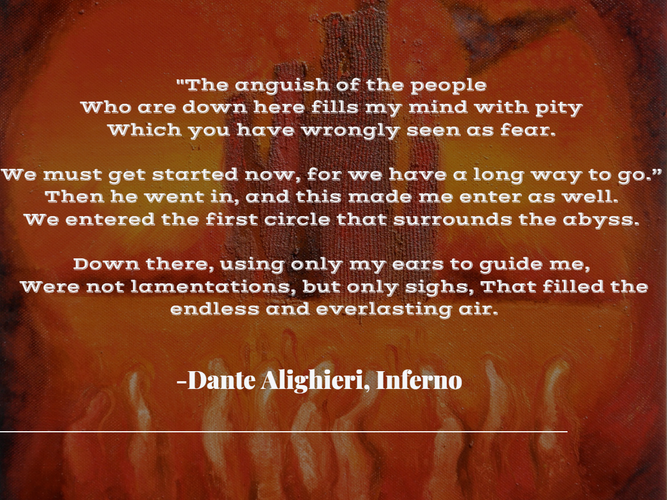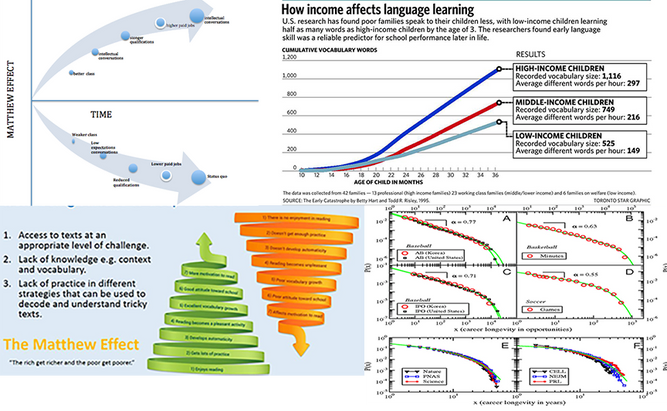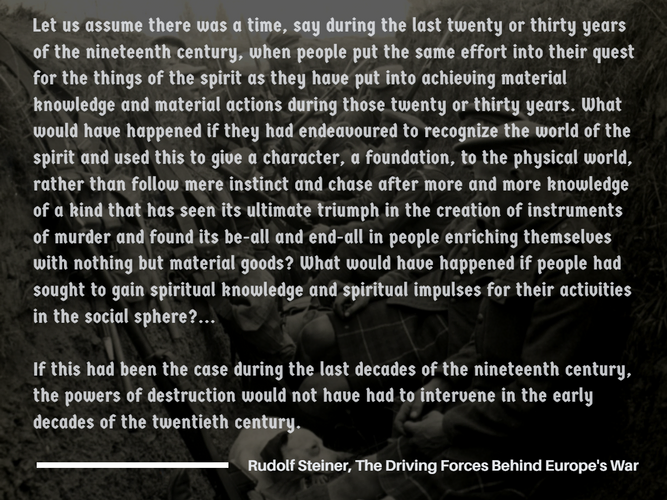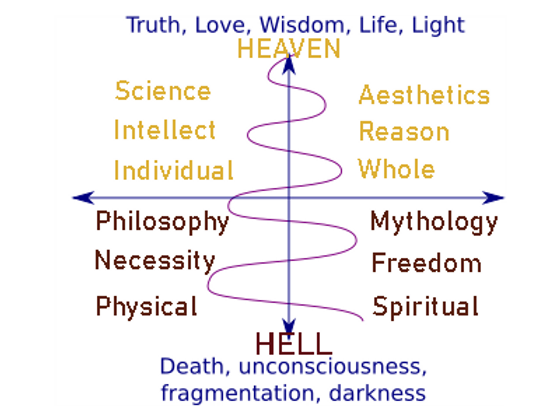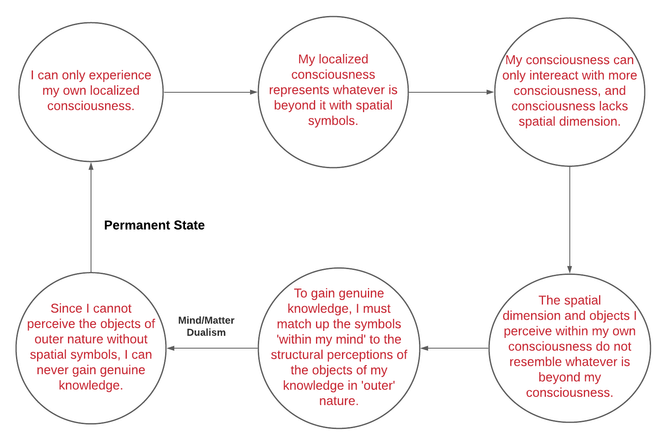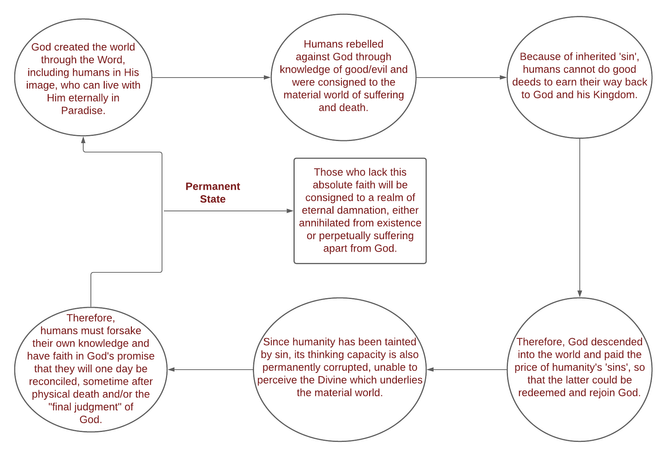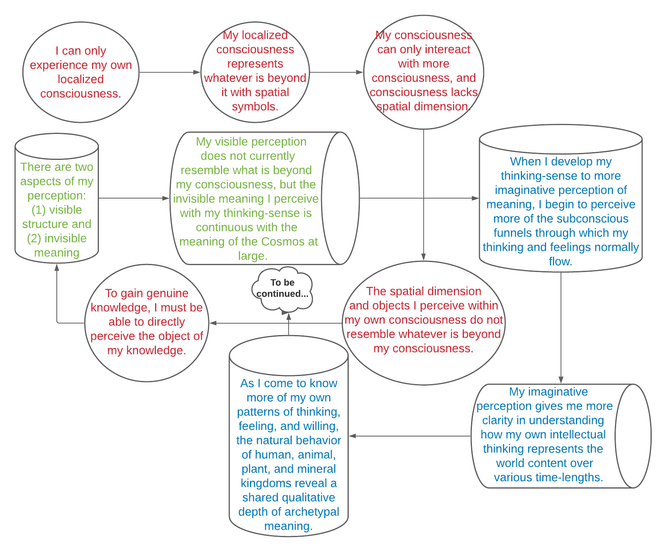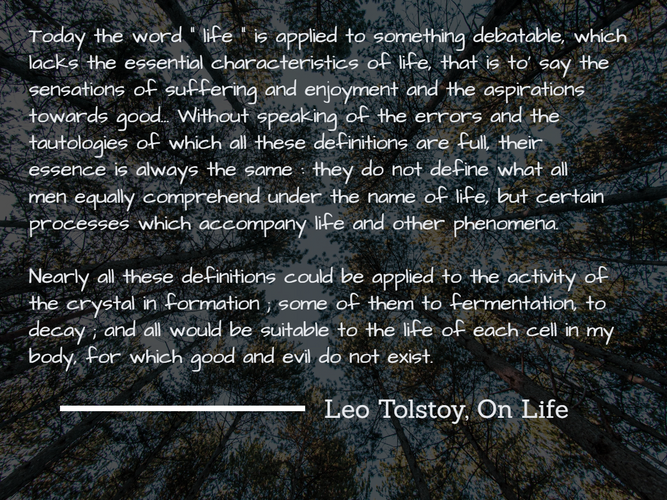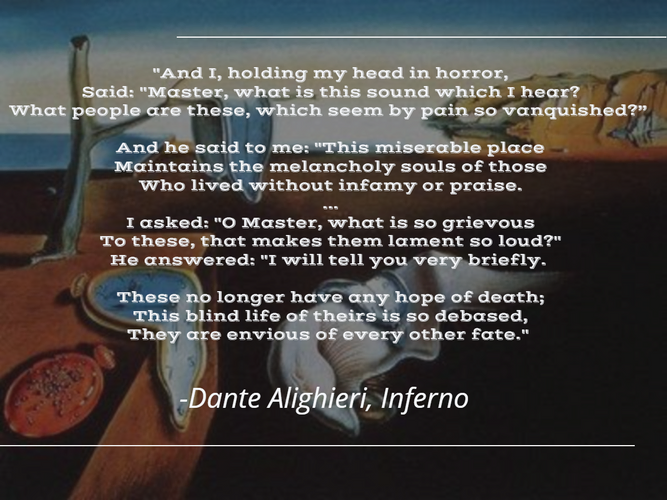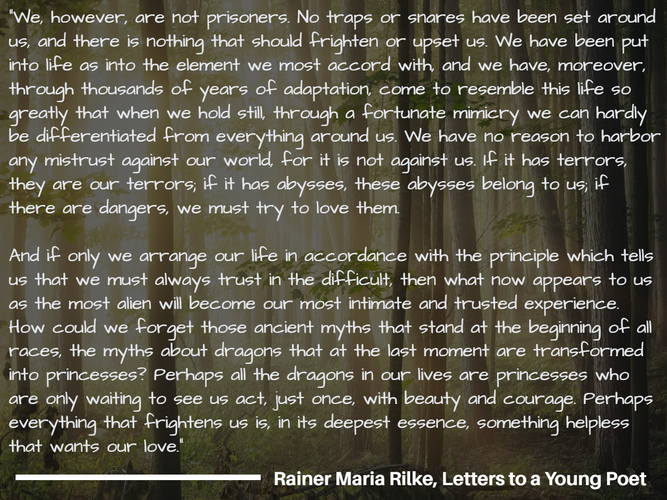Federica wrote: ↑Sun Oct 16, 2022 9:11 am
This was a very helpful reading, Ashvin, thank you!
What was helpful in particular is your ability to decipher the overarching ideas that guide a variety of phenomena, showing precisely how the idea unfold into those phenomena. Through this ideal network you build one can take various standpoints - Hell for example - and from that perspective, one can look back at center and become more and more familiar with it.
Trying to think of falling without an object, the idea that comes is, a wrinkling of space-time. Imagining a curved, reticulated environment, as typically pictured in the standard blog illustration of general relativity, falling would be an unsyncing, a scratch in the smooth, reticulated space-time surface. As an acceleration/deceleration, or distortion/wrinkle in the reticulum, fall feels like the opposite of stagnation, not like the opposite of ascension, with which it shares the same 'wrinkled quality'. In that sense, there wouldn't be any pre-identified directions of the fall. If we deprive the idea of fall from that of gravity, then fall can be circular, as in an infernal loop, or as in spiraling up, as involution or as evolution. Along this lines, I would maybe see two concepts in ‘fall’. Its core-concept is non-stagnation, to which we add here a negative quality of Hell, loss, intellectual rigidity, involution, at the surface-level of the specific phenomenon. But ascent and spiraling up share the same core-concept with fall.
Coming to the Matthew principle, it strikes me that it sounds very close to what is known in secular culture as the
Pareto principle. Stating that, for many outcomes, roughly 80% of consequences come from 20% of causes, it sounds to me like a modern rationalization of the Matthew principle. As noted
here, the principle also tends to hold within the tails of the distribution. As a basic example, if I have 100 clients and 20 of them give me 80% of my income, chances are it holds roughly true that, out of those 20 clients, about four are generating 80% of that 80% of the income. So there is a sort of nested quality of the principle, as an indication of its robust lawfulness. If this reflects an inherent general quality of the Matthew principle, applied to the infernal loops of intellect and the possibility of freely escape them through imaginative thinking, this would be in alignment with what Cleric wrote in the T-C spectrum essay, that there is no in-principle limit to the achievable extent of knowledge of the higher worlds.
For me the difficulty of grasping this principle and how it operates is this: at one level - the aggregate level, would the economist say, or can we say the cosmic order level - it’s static and rigid, while at the individual level - it’s more fluid, subject to individual will. In relation to falling into the infernal loops of intellect, for example, the principle speaks of a stable divergence between a majority of imaginative ideas being thought by a minority of individuals, while at the individual level, the choice remains open as to which side of the scale one wants to bring their thoughts to, the bare intellectual or the imaginative. From here, the difficulty is, how to understand that the individual is implanted in such a cultural dynamic, or law (Matthew principle), where personal choice is free, but also not free? In a sense the materialists, by being such in their thinking, are enabling someone else’s connection to the divine and, vice versa, the one who endeavors to extract themselves from the grips of the intellectual loops and to find that connection, is ‘stepping on one spot on the right side of the scale’. Now others are 'guaranteed' to dwell in Inferno, according to the Matthew principle. Why need there be such preordained rule where one’s freedom on the path is conditioned by everyone else’s freedom? And is it possible to imagine the overcoming of such a law, in a future time when everyone will move in one direction, univocally?
Looking at it from the perspective of Fall, the question becomes: what is the meaning of these time scratches? Is this momentary time-smashing, or time-looseness impressed by the Matthew principle the reason itself and the foundation itself of
multiplicity? It seems to me that the paths of divergence come out of a necessary principle of multiplicity, or inception of multiplicity itself. The principle allows for a critical mass to form asymmetrically, as a breakthrough, so that an imbalance can unfold, and through it, the impulse to restore equilibrium. In this perspective, is the Matthew principle the endogenous principle of evolution itself?
Because no singularity, nothing individual can emerge of perfect sameness and equality. Perfect clones of anything, in space, cannot constitute any real multiplicity. Exact sameness sounds to me as a deceptive non-concept. And multiplicity has to be maintained to an extent, so there is some outward stability to the imbalance, granted by the Matthew principle, or its intellectualized/modelized modern version, the Pareto principle. In other words, variance around the Center is necessary, and there has to be stability in that variance, but is this only up to a point?
Thanks for the thorough reading and great feedback, Federica.
Yes I think you are right that the Matthew principle is reflecting the deeper spiritual meaning of the Pareto principle.
"Why need there be such preordained rule where one’s freedom on the path is conditioned by everyone else’s freedom? And is it possible to imagine the overcoming of such a law, in a future time when everyone will move in one direction, univocally?"
That is a great question and attempts to answer it can easily boggle the mind, as it forces us to escape the linear arrow of time. In short, I would answer 'yes', but the 'law' will be overcome only from the higher, more integrated perspective. To a certain extent, we will eventually become responsible for administering the law for lower life waves going through their human development, as higher beings are now administering it for us. This doesn't mean they are overriding our inner freedom, because they do not interfere in the willing of
how we think. Nevertheless, through the archetypal structure of the Cosmic hysteresis, how we think, feel, and act invariably leads to differentiated streams of Karma and spiritual evolution, to threads of destiny in which 'the first shall be last and the last shall be first'. That is my broad-level resolution on the issue right now, at least.
I think you are absolutely correct to observe that one person's freedom, their evolution in general, is conditioned by everyone else's freedom in the evolutionary stream of their species. Perhaps even the evolutionary stream of all living beings, but we can limit it to humanity for now. We can better understand this if we remember how, at one time, humanity belonged to a group-soul or ego. Our physical bodies were like the particular fingers used as instruments of this group ego. There was no experience of death for the group ego as we experience it on the physical plane today, but more like losing a finger and regenerating a new one. This is still the case with the current animals, who have not evolved their individuated egos yet. So what has happened to the human group soul or ego?
It is still there in higher planes of consciousness. We are still members of this unified organism, only we have individuated so that we may gain full consciousness of how we are related to all other members and thereby attain harmonious functioning with free, creative responsibility for world-creation. It's interesting to contemplate the diverse life experiences of humanity today. When it is Winter for people in the Northern hemisphere, it is Summer for those in the Southern. When it is morning for people in one time zone, it is afternoon, evening, night, for people in others. Some people, at varying locations and elevations, live in closer connection with the soil, some with water, some with air. People live shorter or longer physical lives, with varying worldviews, temperaments, careers, etc. So when we think of all these unfolding experiences as constituting an organic Whole, which is more than simply the sum of its parts (because the Whole is
a priori to the parts), then we have a better idea of the human group-soul. Although we would need to also factor in the many iterations of life between death and rebirth to get a more complete image of the higher Self.
Steiner often remarks that the evolutionary lesson of our current and next epoch is to learn that no individual human can advance their own interest, their own ascent into higher worlds, without also advancing the interests of the Whole, i.e. without genuine spiritual Love. The next epoch will correspond to the Church of Philadelphia in the Book of Revelation, which means 'brotherly love'. It is a dawning remembrance of who we really are in our higher spiritual essence, so that those more advanced, for whatever Karmic reasons, also become more responsible for raising others up with them. This is the true 'missionary work' of the Christ-centered life which will unfold over thousands of years, but has already been planted as a seed which is beginning to grow within the human soul.
Steiner wrote:On the one hand we can thank the descent into matter for our consciousness of self within our physical bodily nature. On the other hand, we thank the Christ event for our ability to ascend with the achievements of the physical world. We thank the Christ principle for our ability to ascend to universal brotherly love, to the universal love of humanity, since we will again unite in groups with love for one another.
If we look back to the time of the original group souls of Atlantis and then into the future we see these four group souls appearing again. The lamb will stand in the middle as a sign for the love that will unite people who will then be living in a bodily nature that is less dense.
But this state must be prepared today through the setting aside of a small group that will carry brotherly love into the future. Therefore, a stream has arisen in our time that will lead to brotherly love through real spiritual knowledge. Humankind will not attain brotherly love through preaching but rather through knowledge. Preachers who constantly speak of love achieve nothing. But if people are given wisdom, knowledge of evolution, in such a way that it becomes life in the soul, then humanity will arrive at love. The soul can attain this when it is warmed by wisdom. Then it can radiate love.
For this reason the masters of wisdom and harmony of feelings have formed this stream for the raying forth of love into humanity and for the influx of wisdom into humanity.
Federica wrote:Hence my question: what is the even higher principle, overarching and encompassing the Matthew principle from above, that allows for both its existence and its overtaking? Is Love that principle? If it is, can we say that the hierarchy of organizing principles of reality goes from Freedom, to Multiplicity, to Love? Freedom is grounded in multiplicity and is fully time-space bound. Multiplicity is bound to time-space only in its expressions, but at its roots it seems directly grounded in the only unifying principle of all - Love. Freedom contains humanity, Multiplicity contains Hell and all polarities and dynamics, and Love enncompasses everything. What Love contains beyond the realms of the lower principles of Freedom and Multiplicity is the power to bring everything back together, making up for all the falls without object, the time scratches, the evil or redemptive spirals of ascent or descent, up or down or sideways across all the many loops - the intellectual, the egoic, the sensory - and have/be everything in eternal unity. Can we say something like that?
When we get to this scale of Cosmic dynamics, there are really infinite ways to validly conceptualize the relations. There are no hard boundaries between Love, Wisdom, Freedom, Truth, etc.. They are always flowing into one another through the fractal, nonlinear iterations of Cosmic metamorphoses. A unity can be a multiplicity from one perspective which can be a higher unity from another, and so on. From our current human perspective, I would say everything you wrote is a valid characterization. We should just be cautious of getting too carried away with trying to 'decode' the whole structure in this way. It's like higher imaginations and inspirations are flowing into our consciousness, but the intellectual ego with its conceptual activity is also remaining firm and acting as a lid, preventing them from releasing their energy to expand our lower self. The internal pressure can then build up to a dangerous degree. This eventually ends up somewhere similar to the rational infernal loops, perhaps even insanity.
I am glad you are reading these old essays and getting value from them, but I personally feel that sometimes I was too ambitious, in an unjustified way, with some of the connections drawn and conclusions made. Not that they were invalid, per se, but that it may have been more wise for me to refrain from making such judgments about the deepest moral laws of the Cosmos at the time. The other issue is that, in my experience, the longer we employ only the intellectual ego to tackle these deepest Cosmic ideas, the more self-satisfied we become with the results attained. We start to lose the feeling of gratitude for the Wisdom bestowed upon us, and it becomes more a matter of pride in how deep we have penetrated with the intellect. At least that has been an issue for me. In that connection, I want to share another passage from Steiner.
The student learns to recognise that if he wishes to arrive at an opinion with which he is himself able to agree, he must live for some while with certain ideas which he has acquired, so that his own etheric body can come to an understanding with them. He learns that he must wait before he can arrive at a certain opinion. Only then does he realise the great significance of the words: ‘Let what is in the soul mature.’ He really becomes more and more modest. But this ‘becoming modest’ is a very special matter, because it is not always possible to hold the balance between being obliged to form an opinion and being able to wait for maturity to have an opinion upon a subject, though delusion about these things is possible to a high degree, and because there is really nothing but life itself which can explain these things. A philosopher may dispute with a person who has reached a certain degree of esoteric development concerning some cosmic mystery, or cosmic law; if the philosopher can only form philosophic opinion he will believe himself necessarily in the right concerning the matter, and we can understand that he must have this belief; but the other person will know quite well that the question cannot be decided by the capacity for judgment possessed by the philosopher. For he knows that in former times he also used the conceptions upon which the philosopher bases his opinion, but allowed them to mature within him, which process made it possible for him to have an opinion on the subject; he knows that he has lived with it, thereby making himself ripe enough to form the opinion which he now pronounces at a higher stage of maturity.
...
Indeed, he gradually notices a certain opposition arise in his soul between the way he formerly judged and the way he now judges after having attained a certain maturity in this particular matter; and he notices that the opinion he formed in the past and the opinion he now holds confront each other like two powers, and he then notices in himself a certain inner mobility of the temporal within him; he notices that the earlier must be overcome by the later. This is the dawn in the consciousness of a certain feeling for time, which arises from the presence of inner conflicts, coming into existence through a certain opposition between the later and the earlier. It is absolutely necessary to acquire this inner feeling, this inner perception of time, for we must remember that we can only learn to experience the etheric when we acquire an inner idea of time. This develops into our always having the feeling that the earlier originates in ourselves, in our judgment, in our knowledge; but that the later flows into us, as it were, streams towards us, is vouchsafed to us. More and more clearly comes the feeling of what was described in the last lecture, viz., that the cleverness which springs from oneself must be separated from the wisdom which is acquired by surrender to the stream flowing towards one from the future. To feel ourselves being filled by thoughts, in contradistinction to our former experiences of consciously forming the thoughts ourselves — this shows progress. When the student learns more and more to feel that he no longer forms thoughts, but that the thoughts think themselves in him — when he has this feeling it is a sign that his etheric body is gradually developing the necessary inner feeling of time.
